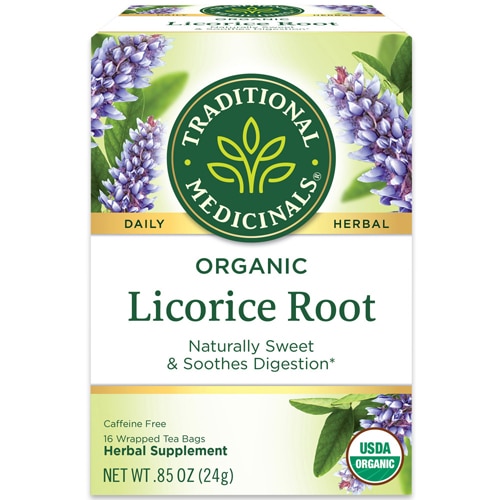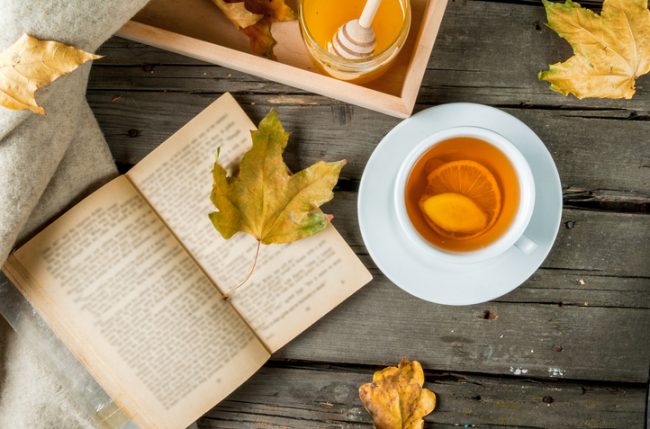Fall is perfectly named—a season of transition as we slip out of summer and fall into winter.
It’s also a time of looking towards the future; an era of both settling in and putting down roots to prepare for the season ahead.
In honor of this, now is the time to celebrate the shift towards the colder months and Earth’s cycles—and there’s no better way to do so than with a cup of health-boosting, root-based herbal tea. Here are five root-based herbal teas (and one that’s simply delicious) to get keen on this fall—and how they can be a boon for your well-being.
1. Ginger
Ginger isn’t just superb for the ale it inspired. An herbaceous perennial—and kin to health powerhouses turmeric and cardamom—ginger has been used for myriad medicinal purposes for over 2,000 years.
There’s a reason behind it. The South Asian root contains gingerol, a relative of capsaicin (the active compound in chili peppers) that naturally supports digestive health, primarily through its potential to curb nausea and vomiting. Ginger is also believed to be one of the top foods to organically encourage a stronger immune system and relieve a dry, itchy throat. What’s more, ginger may put a pep in your step when you’re feeling lethargic or unmotivated—a common complaint when faced with the shorter days that arrive with the cooler season.
Brew tip: While ginger tea is widely available, you can also add thin slices of its root to hot water for a delectable—and potent—brew.
2. Marshmallow root
Marshmallows may have made #4 on the USDA’s list of “Foods of Minimal Nutritional Value,” but they derive their name from one of the most curative plants in existence.
Used for its potential health benefits for thousands of years, marshmallow—whose biological name, Althaea, comes from the Greek word for “cure”—is a demulcent: an herb that is, according to The Naturopathic Herbalist, “rich in mucilage and can soothe and protect irritated or inflamed internal tissue” (and, when used on skin, are dubbed “emollients”). Translation? A mug of marshmallow root tea may ease a sore throat, calm a cough and relieve cold symptoms—all also common issues during autumn. (Indeed, marshmallow root is frequently seen in throat lozenges and cough syrups.) Further, marshmallow root may be particularly helpful for bladder health.
Brew tip: For a particularly powerful brew, add dry, chopped marshmallow root to a pot of boiling water, let simmer for ten minutes, drain out the root and enjoy.
3. Licorice root
Considered a “harmonizing” herb in traditional Chinese medicine—and a rejuvenating herb in Ayurvedic medicine—licorice root has long been used as a means to naturally support the relief of heartburn and organically bolster adrenal health.
Additionally, the wild herb, which grows throughout Europe and parts of Asia, acts as an “expectorant,” the San Francisco Chronicle reports, which “could make it useful for reducing phlegm and other upper-respiratory symptoms…such as sore throats and coughing.” Those looking to shed a few pounds prior to the holiday season may be delighted to know that the distinctive-flavored herb might also reduce body fat. But be careful, do not use this herb if you have high blood pressure.
Brew tip: Pre-packaged licorice tea is readily found, but for a heady, tasty treat, add a tablespoon of licorice root to a cup of hot water and let steep for three to five minutes.
4. Dandelion root
Natural de-bloating has become synonymous with dandelion root in recent years: As Shape affirms, “tea made from the dandelion’s root or leaves has been used in traditional Chinese and Native American medicine for centuries” because of its valuableness as a diuretic (which, in turn, may help your body detoxify).
Used as a medicinal tea as far back as 900 A.D., and rich in vitamins and minerals—especially beta-carotene—dandelion root can also support healthy digestion, bile flow and elimination, says Dr. Robert Kachko, ND, LAc. In other words? Just the magic you need to feel fantastic all season.
Brew tip: Either fresh or dried dandelion roots can be used to brew up a cup of this wonder. Chop the root coarsely, add a teaspoon to a saucepan of boiling water, let simmer for roughly a minute—and then relish.
5. Rooibos
While leaves of this South African bush might be used to brew rooibos—as opposed to its roots—it shares just as many potential benefits as the other herbal teas listed here.
Chief among them? Its high level of antioxidants. Take it from Fox News, who reports that a growing body of evidence suggests that the benefits of rooibos may be quite broad, including some evidence that the antioxidants in the tea may help support heart health and offer anti-aging effects. Rooibos even shows use as a cosmetic ingredient for soothing, protecting and repairing skin.” Importantly, one of those antioxidants is a compound known as quercetin—a flavonoid that, according to the University of Maryland Medical Center, naturally supports heart health and optimal cholesterol and blood pressure levels; it may also neutralize free radicals. Furthermore, a study from “Phytomedicine” demonstrated that rooibos may prevent obesity.
Brew tip: A sweet alternative to caffeinated (read: stimulating) black tea, rooibos tea tastes especially splendid with a squeeze of lemon. Mix a heaping teaspoon of the “red bush” leaves with hot water and let steep for a good, long while—research suggests that the longer you steep, the more antioxidant rewards you’ll reap.
†These statements have not been approved by the Food and Drug Administration. These products are not intended to diagnose, treat, cure or prevent disease.




